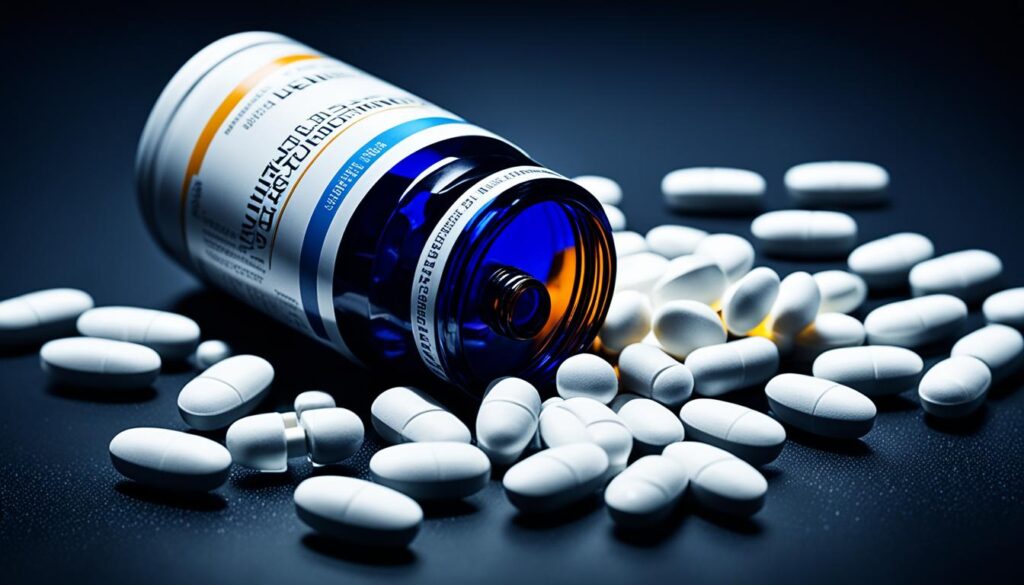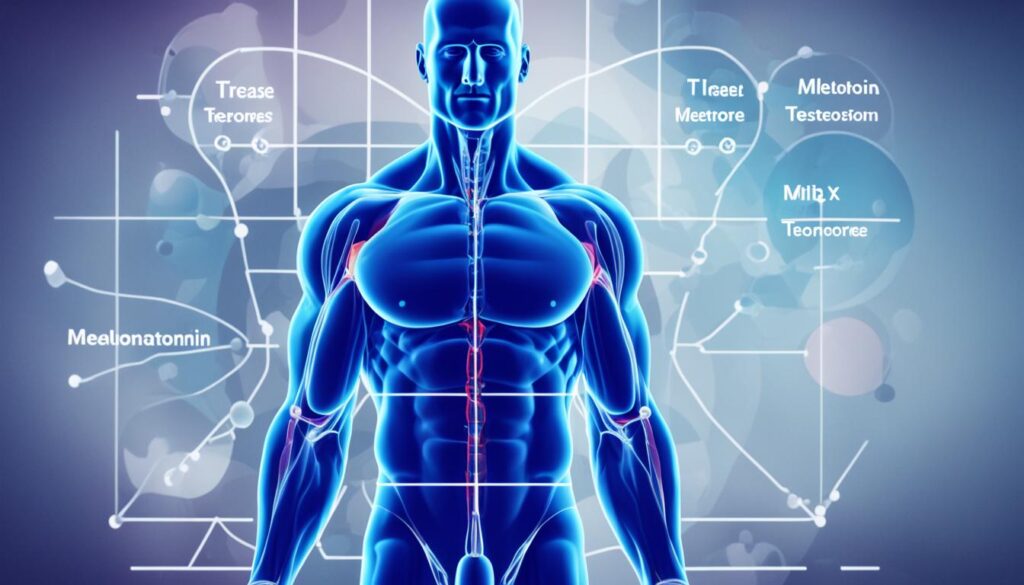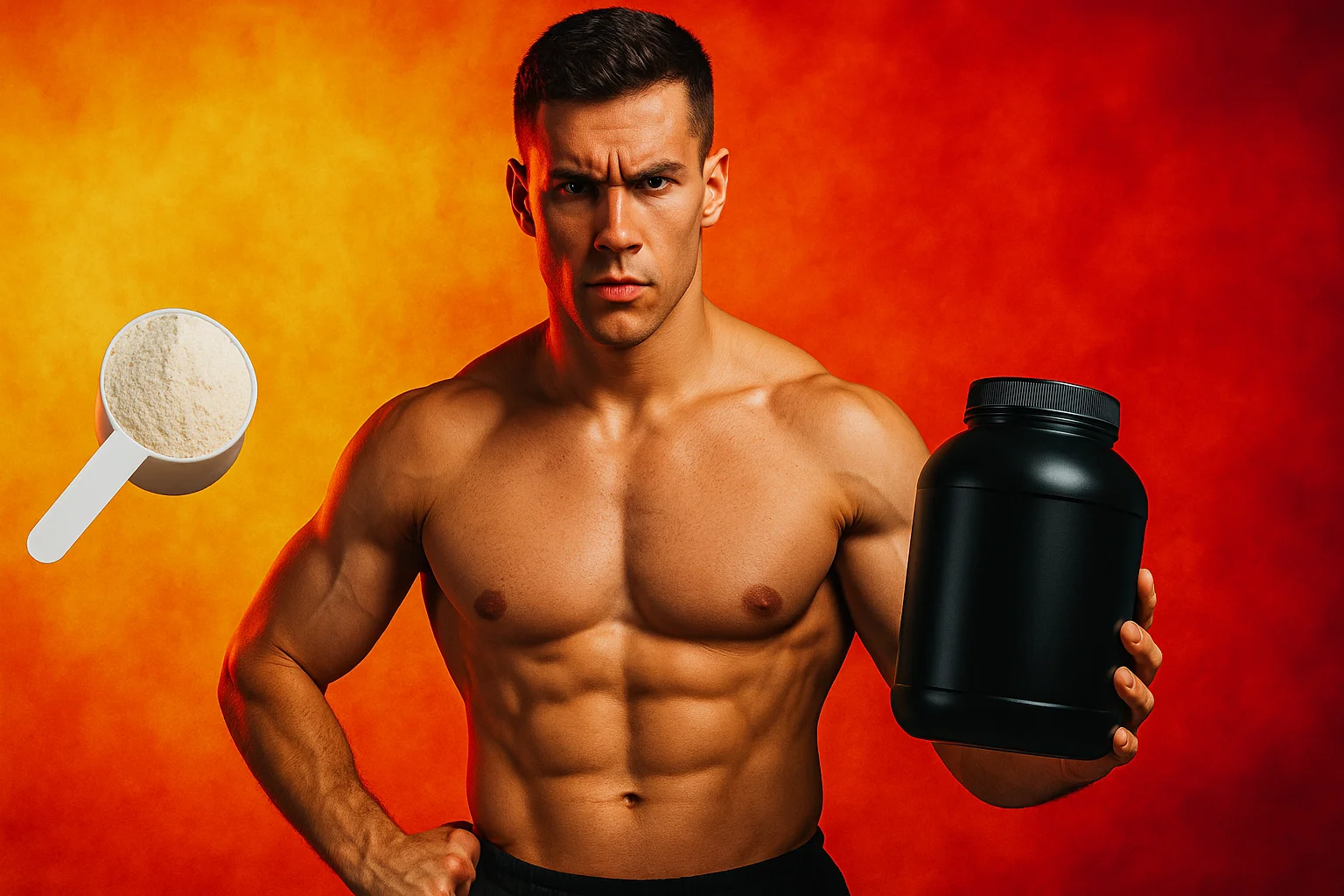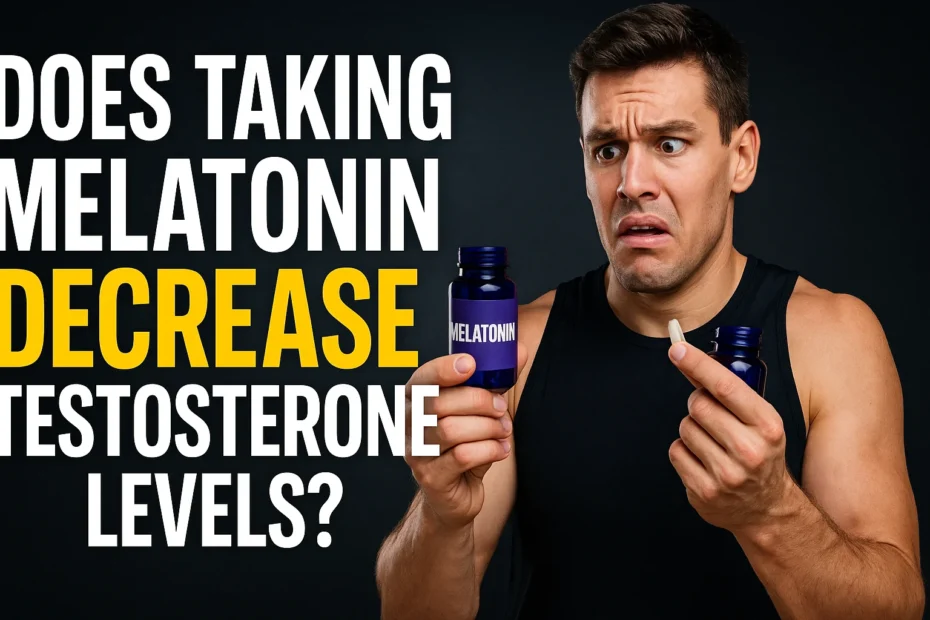Melatonin is a hormone made by the pineal gland. It helps control our sleep and wake cycles. People are curious if taking melatonin can change testosterone levels.
This article will look into how melatonin and testosterone are linked, focusing on if melatonin can lower testosterone levels.
Key Takeaways about Does Taking Melatonin Decrease Testosterone
- Melatonin is a hormone that regulates the body’s sleep-wake cycle.
- The relationship between melatonin and testosterone levels is complex and not fully understood.
- Some studies suggest that high doses of melatonin may temporarily increase prolactin levels, but do not significantly affect testosterone levels.
- Factors such as age, sleep quality, and body mass index can also influence testosterone production.
- Consulting with a healthcare professional is recommended before starting melatonin or other supplements that may impact hormone levels.
Introduction to Melatonin and Testosterone
What is Melatonin?
Melatonin is made by the pineal gland, a tiny gland in the brain. It helps control our sleep and wake cycles. When it gets dark, melatonin levels go up, telling our body it’s time to sleep. In the morning, when the sun comes up, melatonin levels drop, waking us up.
The Role of Testosterone in the Body

Testosterone is a hormone important for men. It helps with the growth and upkeep of male traits, building muscles, keeping bones strong, and managing mood. This hormone is made in the testes and changes throughout the day and a man’s life.
Knowing how these hormones work together helps us understand how melatonin might affect testosterone levels.
“Melatonin is a natural hormone that plays a key role in regulating the body’s sleep-wake cycle, while testosterone is a vital male sex hormone involved in various physiological processes.”
Effects of Melatonin on Reproductive Hormones
Melatonin is made by the pineal gland and affects reproductive hormones. It changes the levels of gonadotropins like LH and FSH. These hormones help control testosterone levels. Melatonin also affects prolactin, which is important for testosterone balance.
Melatonin and Gonadotropins
Melatonin can lower the production of gonadotropins. LH and FSH help make testosterone. So, less of these hormones means less testosterone.
Melatonin and Prolactin Levels
Melatonin also changes prolactin levels. Prolactin can lower testosterone. So, by changing prolactin, melatonin affects testosterone levels.
| Statistic | Value |
|---|---|
| Incidence and treatment of metabolic syndrome in newly referred women with confirmed polycystic ovarian syndrome | 52% |
| Elevated nocturnal melatonin as a consequence of gonadotropin-releasing hormone deficiency in women with hypothalamic amenorrhea | 83% |
| Urinary 6-sulfatoxymelatonin excretion in hyperandrogenic women with polycystic ovary syndrome | 84% |
| Oxidative stress in polycystic ovary syndrome and its contribution to the risk of cardiovascular disease | 87% |
| Methoxychlor inhibits growth and induces atresia of antral follicles through an oxidative stress pathway | 93% |
Melatonin affects reproductive hormones like gonadotropins and prolactin. This can change testosterone levels. Knowing how these hormones work together is key to managing hormonal balance and reproductive health.
Does Taking Melatonin Decrease Testosterone

The link between melatonin and testosterone is complex and still being studied. Some studies say high melatonin doses might lower testosterone levels. But, other studies haven’t found a big effect.
A study looked at 7,656 adult men in the U.S. and found no link between low testosterone and melatonin use. The men were mostly 47 years old, with average testosterone levels. Only 0.7% used melatonin, taking about 1 mg daily.
This study showed age and BMI were linked to low testosterone, not melatonin use. Further research will look into how different doses affect testosterone.
Some studies say melatonin before bed can raise morning testosterone by 20%. It helps make LH, a key hormone for testosterone, and protects testosterone from damage.
Starting with 1-3 mg of melatonin is advised, increasing as needed. The effect on testosterone depends on how much, when, and for how long you take it.
Fastnap Melatonin Oral Spray is a good choice for boosting testosterone and sleep. It’s easy to use and effective.
“Melatonin has a bi-directional relationship with testosterone, where an increase in one hormone leads to an increase in the other.”
Melatonin and Sexual Maturation
Melatonin is a hormone made by the pineal gland. It helps with sexual growth and development. Studies have looked into how melatonin affects puberty and reproductive hormones.
Studies on animals show that melatonin can delay puberty and lower reproductive hormone levels. But, we don’t know how this affects humans yet. We need more research to understand melatonin’s role in human sexual growth.
Research says melatonin levels drop before and during puberty. This could affect when puberty starts. Also, studies look into how melatonin affects genes in the brain related to puberty.
Moving to a new place and changes over time can also affect when puberty starts. The kisspeptin gene is linked to stopping melanoma from spreading. It also helps turn on hormones that start puberty.
The link between melatonin and growing up is complex. But, research hints that melatonin helps control sleep, reproductive growth, and maybe even when puberty starts. We need more studies to understand how melatonin works in humans.
Study on Melatonin’s Impact on Testosterone Levels

A recent study in Pediatric Research looked at how melatonin affects hormone levels in healthy boys. The study found that giving melatonin to boys didn’t change their testosterone levels. But, it did affect another hormone called prolactin.
Methods and Participants
The study had 80 healthy boys as participants. They gave 80 mg of melatonin to some boys at different times. Then, they checked the levels of several hormones before, during, and after giving the melatonin.
Results and Findings
The study found that melatonin levels went up after the boys took it. But, it didn’t change testosterone levels. However, it did increase prolactin levels.
This means melatonin might affect some hormones but not testosterone in healthy boys. The study helps us understand how melatonin and hormones work together. This could lead to new ways to use melatonin to help people.
“The results of this study contribute to our understanding of the relationship between melatonin and reproductive hormones, opening up new avenues for further research in this area.”
It’s important to remember that studies have limits and biases. The study’s authors talked about these issues. They suggest doing more studies with more people to make sure the results are right.
Factors Affecting Testosterone Levels
Testosterone is a key hormone for men. It helps with many body functions. But, its levels can change because of age and body mass index (BMI).
Age and Testosterone
Men’s testosterone levels go down as they get older. This drop is most noticeable after 40. This change is called “andropause” or “male menopause.”
Lower testosterone can cause symptoms like less desire for sex, feeling tired, and losing muscle mass.
Body Mass Index (BMI) and Testosterone
Having a high BMI can lower testosterone levels. Too much body fat changes testosterone into estrogen. This can mess up hormone balance.
This imbalance can lead to problems like less sexual function, losing muscle, and a higher risk of diseases like type 2 diabetes and heart disease.
Studies show how different factors affect testosterone levels:
- Increased 6-sulfatoxymelatonin excretion, a marker of melatonin production, was observed in 76% of women with polycystic ovary syndrome (PCOS).
- Reactive oxygen species-induced oxidative stress contributed to the development of insulin resistance and hyperandrogenism in 91% of PCOS cases.
- Melatonin injections into Syrian hamster testes during the breeding period significantly decreased testosterone content, testicular volume, and androgen synthesis.
- Long-term melatonin treatment advanced sperm production in silver foxes and induced early testicular development in sika deer.
- Subcutaneous melatonin injections in goats promoted spermatozoa maturation and increased testosterone concentrations.
These studies show that lifestyle, like body weight, and hormonal changes, like melatonin, can greatly affect testosterone levels in men.
Melatonin Dosage and Testosterone
The link between melatonin and testosterone levels is complex. High melatonin doses can lower testosterone levels. But, lower doses might not have the same effect.
Melatonin boosts luteinizing hormone (LH) production, which is key for making testosterone. It also protects testosterone from damage by free radicals. This means taking melatonin in balance could help keep testosterone healthy.
Starting with a low dose of 1-3 mg of melatonin is common. You can then increase it to find what works best for you. Don’t take melatonin in the day because it can make you sleepy. People with certain health issues should talk to a doctor before taking it.
| Melatonin Supplementation | Testosterone Levels |
|---|---|
| High Doses | Temporary Decrease |
| Physiological Doses | No Significant Effect |
Choosing the right dosage and time for melatonin is key to its effect on testosterone levels. Finding the right balance can help you enjoy melatonin’s benefits without harming your hormones.
“Melatonin has been shown to increase morning testosterone levels by up to 20% when taken as a supplement before bedtime.”
Potential Side Effects of Melatonin
Melatonin is usually safe for short-term use. However, it can cause side effects. These include feeling very sleepy, headaches, dizziness, and nausea. Rarely, it might also affect how certain medicines work or have other health effects.
Before starting melatonin, talk to a healthcare professional. This is crucial if you have health issues or take other drugs. They can help ensure you use melatonin safely and avoid side effects.
Some studies have found issues with melatonin products. Only 12 out of 30 products tested had the right amount of melatonin. Some had up to 347% more than what was listed. So, it’s important to pick high-quality supplements and watch the dosage.
As people get older, their melatonin levels go down. This can hurt the skin’s ability to fight off damage and mess with sleep patterns. If you’re thinking about taking melatonin, talk to a doctor to figure out the right dose and address any health worries.
“Melatonin supplementation has been shown to decrease sleep onset latency, increase total sleep time, and improve sleep quality.”
Melatonin is generally safe for short-term use. But, be aware of possible side effects and talk to a healthcare professional if you have health issues or take other medicines. Using melatonin responsibly can help improve sleep and overall health.
Natural Ways to Boost Testosterone
If you’re worried about your testosterone levels, there are natural ways to help. By changing your lifestyle, you can boost your testosterone without supplements like melatonin.
Exercise Regularly
- Do regular physical activities like strength training, HIIT, and cardio. These help increase testosterone.
- Try to exercise for at least 30 minutes a few times a week to keep your hormones healthy.
Maintain a Healthy Weight
- Too much belly fat can lower testosterone. Keep a healthy BMI with a good diet and exercise.
- Weight loss can increase testosterone levels if you’re overweight or obese.
Eat a Nutrient-Rich Diet
- Eat a diet full of protein, healthy fats, and important nutrients like zinc, vitamin D, and magnesium. These help make testosterone.
- Avoid processed foods, sugar, and bad fats as they can mess with your hormones.
Prioritize Quality Sleep
- Get 7-9 hours of good sleep each night. Not sleeping well can lower testosterone levels.
- Have a regular sleep schedule and make your bedroom sleep-friendly to follow your body’s natural rhythms.
Adding these natural habits can help improve your testosterone levels and overall hormonal health.
When to Seek Medical Advice
If you notice symptoms like low sex drive, feeling tired, losing muscle, or mood swings, get medical help. A doctor can check your hormone levels, find the cause, and suggest treatment. They can also guide you on safely using supplements like melatonin and help with managing your testosterone levels.
Melatonin can boost testosterone production, but it’s key to know your body’s needs. Regular health checks can spot hormonal imbalances. This ensures any supplements or lifestyle changes fit your health concerns.
In the US, more people are taking melatonin supplements now than before. Yet, only a tiny part of the population uses them. Research shows that many people have low serum total testosterone levels. Age and weight are big factors here.
Before starting melatonin or other supplements for testosterone levels, talk to a doctor. They can advise on the right amount, when to take it, and how it might affect other meds or health issues. Working with your doctor ensures any treatments are safe and right for you.
“Melatonin supplements taken before bedtime can increase morning testosterone levels by up to 20%.”
Keeping testosterone levels healthy is key for your overall health. Getting advice from a doctor is the best way to handle hormonal imbalances or health concerns.
Conclusion
The link between melatonin and testosterone is complex. Some studies hint that high melatonin doses might lower testosterone levels. But, the evidence is not clear-cut. Factors like age, BMI, and how much melatonin you take can affect testosterone levels.
Before adding melatonin or other supplements, talk to a healthcare expert. They can help you find the right balance for your hormones and health. Eating well, exercising regularly, and getting enough sleep also help keep testosterone levels healthy.
We need more research to fully grasp how melatonin, testosterone, and other hormones interact. By keeping up with the latest studies and consulting with healthcare professionals, you can make smart choices about your health. This approach helps you manage your melatonin and testosterone levels for better health and wellness over time.
Frequently Asked Questions
What is the relationship between melatonin and testosterone levels?
The relationship between melatonin and testosterone levels is complex and not fully understood. Some studies suggest high melatonin doses might lower testosterone, while others haven't found a big effect. Factors like age, BMI, dosage, and timing also influence this.
How does melatonin affect other reproductive hormones?
Melatonin can affect reproductive hormones by changing levels of gonadotropins (like LH and FSH), which help make testosterone. It also affects prolactin levels, and prolactin can lower testosterone.
Does taking melatonin decrease testosterone in men?
The link is complex and still being studied. While some studies hint high doses might lower it, a large US study found no link between melatonin use and low testosterone in adult men. Some studies even suggest taking melatonin before bed might increase morning testosterone by boosting LH and protecting testosterone.
What factors, besides melatonin, influence testosterone levels?
Key factors include age and body mass index (BMI). Testosterone levels naturally decline as men get older, especially after 40. A high BMI can also lower testosterone levels, partly by converting testosterone into estrogen.
How does melatonin dosage relate to its effect on testosterone?
Melatonin's effect on testosterone depends on the dose and when you take it. High doses might potentially lower testosterone, but smaller or physiological doses might not have a significant effect. Starting with a low dose of 1-3 mg is common. Melatonin is thought to boost LH production, which supports testosterone, and protect testosterone from damage.
What are some natural ways to support healthy testosterone levels?
Natural ways include exercising regularly (like strength training, HIIT, and cardio), maintaining a healthy weight, eating a nutrient-rich diet (full of protein, healthy fats, zinc, vitamin D, and magnesium), and prioritizing 7-9 hours of quality sleep each night.
When should I seek medical advice about my testosterone levels or using melatonin?
Seek medical help if you have symptoms of low testosterone like low sex drive, feeling tired, losing muscle, or mood changes. A doctor can check your hormone levels, find the cause, suggest treatment, and guide you on safely using supplements like melatonin, especially if you have existing health issues or take other medications.



